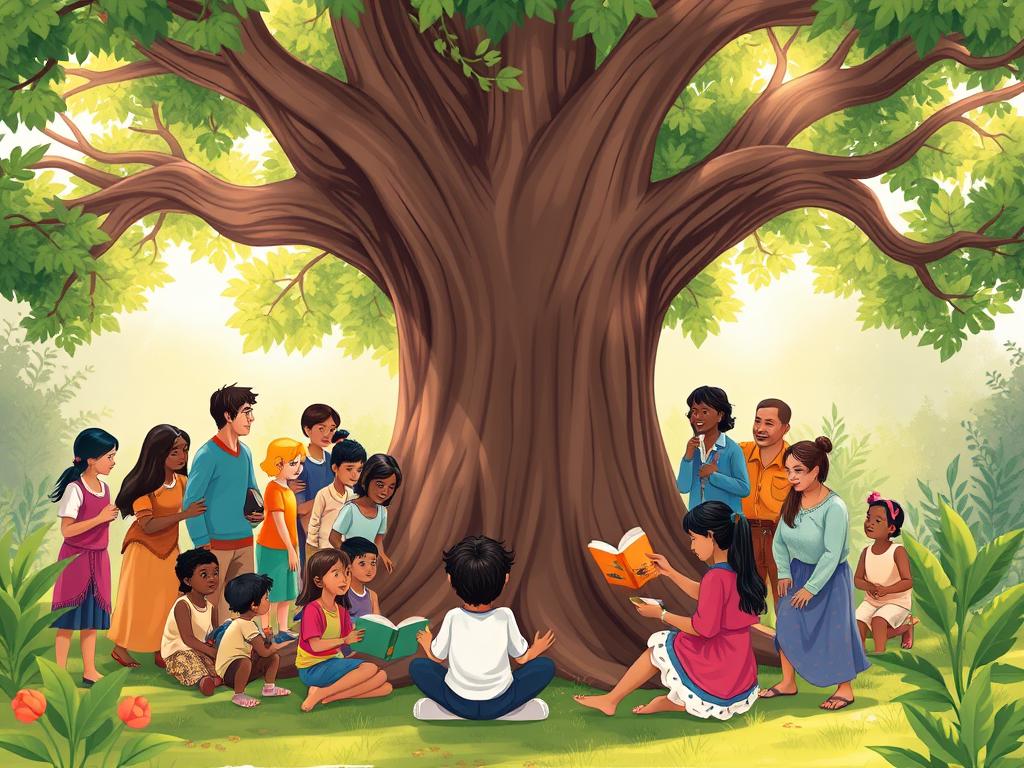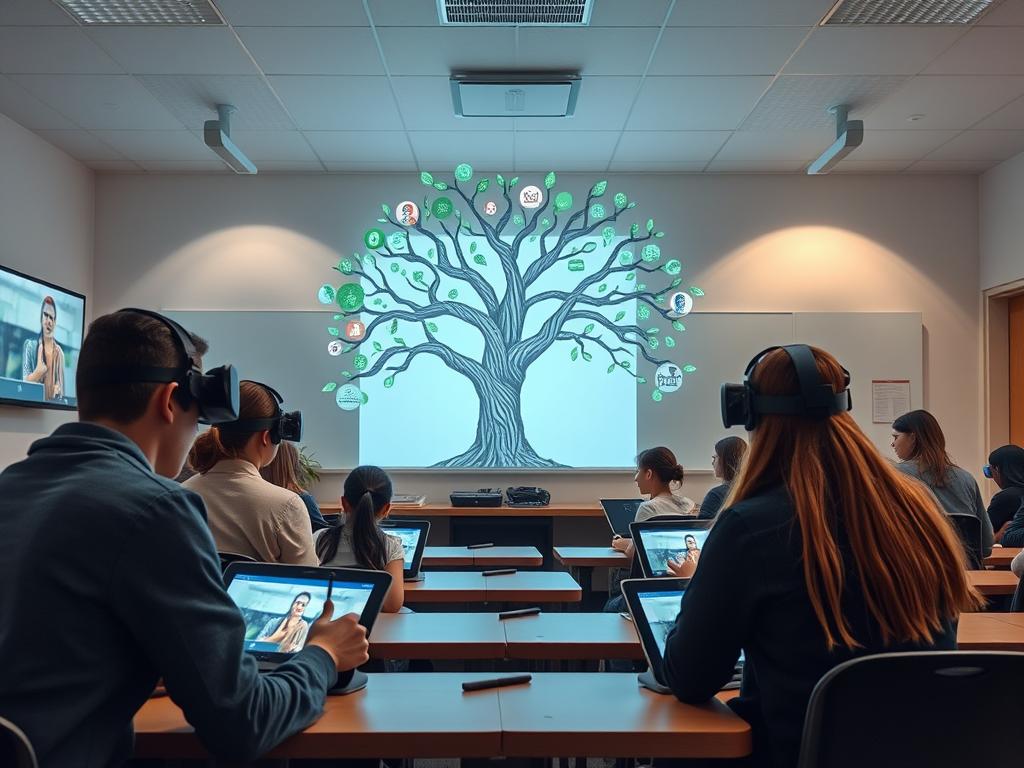In a bustling city, a high school classroom buzzes with the anticipatory energy of students eager to tackle a new project. Ms. Johnson, a passionate educator, notices the diverse opinions forming around a controversial ethical dilemma: Should artificial intelligence have the same rights as humans? With this topic, she seizes the moment to incorporate moral education into the discussion.
As her students exchange views, they explore concepts like empathy, integrity, and the moral responsibilities of technology. It’s a refreshing reminder of the importance of moral education in the modern age, where developing character traits is crucial for personal and professional success.
With the rapid changes in technology and society, ensuring that young minds are equipped with strong moral foundations is essential. This approach not only fosters character development but also helps students navigate complex social dilemmas with confidence. Inspired by the principles of ancient philosophers like Aristotle, who believed that virtues must be practiced, Ms. Johnson emphasizes that moral education is as pertinent today as it ever was.
As we delve into the critical aspects of moral education, we’ll explore how ancient wisdom can inform contemporary teaching, the role of families, and the community in nurturing virtues, and the evolving landscape of ethics shaped by advancements in technology.
Key Takeaways
- Moral education develops character traits vital for success in personal and professional realms.
- Incorporating the Socratic Method enhances critical thinking and collaboration skills in students.
- Virtue is cultivated through consistent practice, aligning with 21st-century education goals.
- Educators play a crucial role in modeling virtues and fostering a safe space for growth.
- Holistic education involves integrating moral education alongside intellectual development.
- The interconnected world necessitates ethically minded individuals who contribute positively to society.
Understanding Moral Education in Today’s Society
Moral education plays a vital role in shaping individuals, emphasizing the importance of morals and developing character. In contemporary society, this educational approach extends beyond traditional academics, focusing on instilling ethical principles such as integrity, empathy, and responsibility. As communities engage in educating for morality, various influences reshape how moral values are taught.
What is Moral Education?
Moral education encompasses methods and strategies aimed at imparting ethical values to individuals. Schools increasingly incorporate lessons that instill moral virtues, showcasing a return to character education, which has roots dating back to the early 1980s. Countries around the world have recognized the value of dedicated classes to teach good manners and socially acceptable behavior. While some private institutions may lean towards specific moral teachings influenced by their beliefs, public schools serve a diverse student body, necessitating a careful approach to moral discussions. This diversity means teachers must avoid imposing any single political or religious viewpoint, fostering an environment where students can share their values and perspectives.
The Role of Family in Moral Development
Families significantly influence moral development and are essential in guiding children’s understanding of right and wrong. For effective moral education, parents must exemplify virtuous behavior, as children learn by observing and emulating those around them. Early ethical teachings set the foundation for a lifelong commitment to morality, highlighting the importance of morals taught within the household. Historical perspectives, such as those from Horace Mann in the nineteenth century, stress that moral education can help prevent societal issues by instilling values from a young age. Engaging in discussions around morals within the family unit prepares individuals for challenges in an increasingly complex world.

Historical Context of Moral Education
The historical context of moral education plays a crucial role in understanding how philosophies of virtue have shaped educational practices over the centuries. Insights from ancient philosophers remain relevant, offering a foundation for contemporary approaches to moral development.
Lessons from Ancient Philosophers
Philosophers such as Socrates, Plato, and Aristotle emphasized the significance of character development in education. In ancient Greece, the fundamental purpose of education revolved around cultivating virtues necessary for a virtuous life. Aristotle’s work in “Nicomachean Ethics” illustrates the connection between virtue and happiness, laying groundwork for personal integrity and moral ethics. These themes resonate throughout history, highlighting the enduring importance of moral instruction.
The Evolution of Moral Education Approaches
Over time, the evolution of moral education reflects broader societal changes. In medieval education, the focus shifted to teaching ancient texts, fostering not only intellectual growth but also spiritual and moral enlightenment. The late nineteenth and early twentieth centuries experienced a backlash against organized religion, leading institutions to centralize moral education within families and religious contexts, rather than schools. Secularization and the rise of personalism in the 1960s underscored a preference for individual rights over collective responsibilities.
Today, education systems in liberal democracies grapple with the decline of character education due to secular influences. The Enlightenment era introduced new philosophical perspectives, emphasizing human rationality and the pursuit of happiness. The introduction of Darwinism further reshaped moral philosophy, framing morality as a fluid concept impacted by societal evolution. As we adapt to the Information Age, a pressing need arises to integrate moral education into a networked world, cultivating creative and tolerant individuals who value respect.

Incorporating motivational elements such as inspirational quotes can enhance learning experiences. Utilizing quotes from influential figures like Gandhi and Malcolm X serves as a catalyst for fostering a love for lifelong learning in students. By creating an environment rich with motivation, educators can inspire curiosity and resilience, strengthening the moral fabric of future generations. For more insight into this, explore education quotes to spark your passion for.
The Impact of Technology on Moral Education
The rapid advancement of technology has altered many aspects of education, particularly in moral education. This shift creates both opportunities for deeper understanding and challenges that complicate both teaching and learning. The impact of technology on moral education is significant, as digital media can serve as a platform for discussing ethics while presenting various moral frameworks. Engaging with these complex realities becomes crucial for educators and students alike.
Digital Media and Its Influence
Digital media has emerged as a vital tool in transforming how moral values are perceived and taught. A study involving 250 secondary school students revealed that while perceptions of digital literacy were generally high, perceptions of moral values in digital environments reported a more moderate stance. This discrepancy highlights a need for redefining what constitutes moral education in relation to various digital platforms.
Participants who spent more than three hours online daily exhibited lower scores in moral values, indicating a potential negative influence of excessive online interaction. On the other hand, those engaged in social media activities showed higher digital literacy scores, emphasizing how varied experiences with digital media shape ethical awareness.
Addressing Online Ethics in Learning
As the exploration of online ethics becomes more critical, it is essential to understand how students engage with digital tools. Recent literature stresses the importance of incorporating moral values and ethical considerations into online learning environments. Insights from pivotal studies indicate that moral values explained about 19.6% of digital literacy.
Engaging with online ethics entails recognizing the diverse perspectives students might encounter, promoting a balanced approach to moral decision-making in the context of rapidly shifting technological landscapes. To summarize, fostering a robust ethical framework amid technology use empowers students to navigate the complexities of modern digital environments effectively.

Integrating Moral Education in Schools
Integrating moral education in schools is essential for fostering character development and ethical behavior among students. A comprehensive moral education curriculum lays the groundwork for nurturing values such as honesty, fairness, and responsibility. Through deliberate curriculum development, educators can create programs that focus on these core principles, thereby equipping students with the skills they need to navigate moral dilemmas effectively.
Curriculum Development for Moral Values
Moral education curricula should encompass a range of ethical teachings that resonate with students. Historical approaches, such as those advocated by Horace Mann and more contemporary frameworks, highlight the importance of character education. The Ministry of Education’s Moral Education Programme in the UAE illustrates how structured learning can reinforce moral values across different grades. Such programs ensure that moral education is consistent and comprehensive, providing benefits that extend beyond academic performance.
Teacher Training and Support
Teacher training remains crucial in implementing an effective moral education curriculum. Educators must receive both initial and ongoing training to develop the skills necessary for fostering ethical behavior in the classroom. Programs like “Ethics across the Curriculum” emphasize the importance of providing teachers with the tools to model virtues and engage students in discussions about moral dilemmas. By focusing on teacher training, schools can create a supportive environment where moral principles are not just taught but lived.
As mentioned in various studies, schools that prioritize character development tend to experience lower incidences of violence, demonstrating the long-term benefits of integrating moral education. For a deeper dive into creative strategies for enhancing self-esteem and fostering teamwork skills in children, explore engaging activities that effectively link with moral education.
Creative activities to enhance self-worthare vital for nurturing these skills, ultimately shaping ethical individuals who contribute positively to society.
The Role of Community in Moral Formation
Communities serve as critical platforms for moral development, providing opportunities for individuals to engage actively with one another. The involvement of local organizations in moral education efforts can strengthen community ties and foster a shared sense of responsibility. Through collaboration with these organizations, individuals not only learn ethical principles but also practice them in real-world scenarios, contributing to their overall growth in character.
Engaging Local Organizations
Local organizations play an essential role in shaping ethical values within communities. They facilitate various initiatives that promote moral education through workshops, mentoring programs, and community service. Participation in these events creates avenues for individuals to explore and develop their ethical decision-making abilities. A significant 45% of educators emphasize the need for community involvement to address the ethical values within educational settings. As such, integration between educational institutions and community organizations becomes vital for enhancing moral formation.
Service Learning Opportunities
Service learning programs allow students to engage in their communities while contributing positively. Through these programs, participants apply what they learn in classrooms to address real community issues. Statistics reveal that 92% of students exposed to ethics education demonstrate improved conflict resolution skills, indicating the effectiveness of service learning in promoting moral development. By immersing themselves in community service, students cultivate empathy, accountability, and leadership skills, which are foundational for responsible citizenship.
| Statistic | Percentage |
|---|---|
| Educators believing ethics is critical to moral development | 78% |
| Students with better conflict resolution skills from ethics education | 92% |
| Educational institutions incorporating character education programs | 65% |
| Educators facing challenges in assessing moral behavior | 84% |
| Educators needing more training in ethics education | 60% |
| Professionals seeing digital ethics as important | 70% |
Engaging with local organizations and participating in service learning opportunities plays a pivotal role in the community’s involvement in moral development. Initiatives like these not only enhance individual moral growth but also contribute meaningfully to the collective ethical standards within society. For more insights on fostering moral freedom through community participation, visit this article.
Challenges Facing Moral Education Today
The landscape of moral education presents significant challenges that educators and society must navigate. One pressing issue involves cultural relativism, which can complicate the establishment of universal ethical standards. As different cultures emphasize varying values and beliefs, it becomes essential to address these discrepancies in moral education. Understanding this concept aids in fostering discussions that acknowledge diverse perspectives and encourage a more inclusive approach to teaching ethics.
Cultural Relativism and Its Effects
Cultural relativism asserts that moral values are not absolute and can differ based on societal context. This viewpoint has a profound impact on the challenges of moral education. Educators must carefully consider how to convey moral principles without dismissing the cultural backgrounds of their students. The task requires a delicate balance, promoting respect for differences while instilling shared ethical values. Engaging students in discussions that explore the nuances of their varied cultural experiences can enhance their understanding of morality in a global context.
Addressing Ethical Dilemmas in Modern Life
Modern life introduces a myriad of ethical dilemmas, from technological advancements to social justice issues. These challenges further complicate moral education as students encounter real-world scenarios that require critical thinking and ethical reasoning. Educators are tasked with facilitating open dialogues that empower students to navigate these dilemmas effectively. By integrating frameworks like Philosophy for/with Children, students can reflect on their experiences and engage in ethical discussions, allowing them to develop their moral judgement over time.
| Challenge | Description | Approaches |
|---|---|---|
| Cultural Relativism | Different cultures emphasize varying ethical values and beliefs | Promoting respect for diverse perspectives and fostering discussions |
| Ethical Dilemmas | Real-world scenarios that challenge established moral frameworks | Encouraging critical thinking and participatory engagement in ethical discussions |
| Moral Plurality | The need for an inclusive approach encompassing various cultural insights | Integrating moral education with a diverse curriculum and stakeholder engagement |
Through these complex challenges, the role of moral education remains crucial for shaping responsible, ethical individuals. Engaging students in discussions surrounding their cultural backgrounds and the ethical dilemmas they face can empower them to approach moral issues with confidence and integrity. For parents aiming to support their children in developing critical life skills necessary for encountering these challenges, teaching essential life skills early on proves to be invaluable.
The Future of Moral Education
As we look ahead, the future of moral education is set to undergo significant transformations, leveraging innovative practices that resonate with today’s evolving societal values. Educational methodologies that emphasize experiential learning and community participation are becoming more prominent, enabling students to engage with ethical principles in practical settings. This hands-on approach not only enriches understanding but also fosters a sense of responsibility toward social and environmental issues.
Innovative Approaches and Practices
Many educational institutions are already integrating moral education into their curricula, showing a notable percentage change in student behavior following implementation. Innovative practices, such as interactive workshops and collaborative projects, create dynamic learning environments where students can develop empathy and social awareness. This engagement is crucial for cultivating future leaders who prioritize ethical considerations and civic responsibility.
The Role of Parents and Guardians in Continuing Education
Equally important is the role of parents and guardians in reinforcing the values imparted in schools. Studies demonstrate that children consistently exposed to moral education at home exhibit improved character traits and ethical reasoning, significantly contributing to their overall development as compassionate individuals. By fostering open conversations about values and ethics, parents can ensure that moral education remains a shared journey, bridging classroom learning with real-world applications. Ultimately, as educators and families work together, we can aspire to shape a generation committed to positive change and moral integrity.











